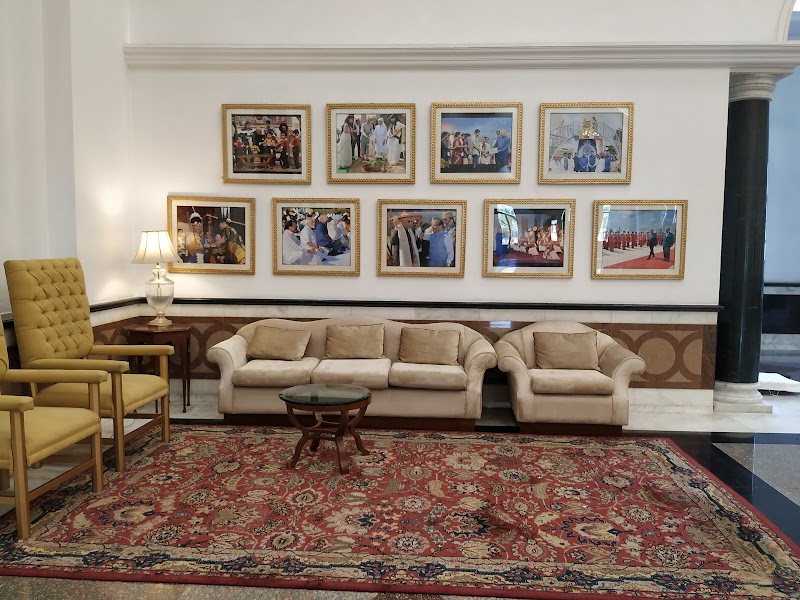Dr. Rajendra Prasad served as the first President of India, holding office from 1950 to 1962. An esteemed lawyer, scholar, and freedom fighter, Prasad played a pivotal role in India’s independence movement and the drafting of its constitution.
Born on December 3, 1884, in Siwan, Bihar, Prasad belonged to the Kayastha caste. He pursued his education at Calcutta University and later at the University of Allahabad, where he earned a law degree. Prasad actively participated in the Indian National Congress, aligning himself with Mahatma Gandhi’s non-violent civil disobedience movement.
During the struggle for independence, Prasad’s unwavering dedication and leadership qualities earned him widespread recognition. He served as President of the Constituent Assembly of India, the body tasked with drafting the country’s constitution. His profound knowledge of law and his commitment to democratic principles greatly influenced the shape of the Indian constitution.
- Achievements:
- Prasad’s tenure as President was marked by several notable achievements:
- He played a crucial role in promoting national unity and integration.
- He initiated land reforms and community development programs to address rural poverty.
- He supported the development of educational institutions and emphasized the importance of scientific research.
- Prasad’s commitment to the rule of law and constitutional values strengthened India’s democratic foundations.
- Legacy:
- Prasad’s legacy extends beyond his presidency.
- He is remembered as a symbol of integrity, simplicity, and selfless service.
- His contribution to the Indian constitution and his role in shaping the nation’s early years as an independent republic earned him immense respect.
- Prasad’s writings and speeches continue to inspire generations of Indians.
Prasad’s popularity stemmed from his humility, profound knowledge, and unwavering commitment to the well-being of the Indian people. He passed away on February 28, 1963, leaving behind a legacy of leadership, dedication, and service that continues to inspire Indians to this day.

Emblem of India
To enrich your insights into presidential figures worldwide, also explore some prominent first presidents from other countries, such as Iceland, Hungary and Honduras. Delving into the leadership journeys of these figures can offer valuable perspectives on their historical significance and pivotal roles in shaping global politics.
The official residence and symbol of the India President
10 Iconic Presidents Who Shaped India’s History

India, the world’s largest democracy, has seen numerous popular leaders hold the position of President. These individuals have made significant contributions to the development and progress of the country. Here are 10 of the most popular Presidents in India:
- Dr. Rajendra Prasad: Serving as the first President of India from 1950 to 1962, Dr. Rajendra Prasad is highly regarded for laying the foundation of the country’s democratic system. He played a crucial role in drafting the Indian Constitution.
- Dr. A.P.J. Abdul Kalam: Known as the ‘People’s President,’ Dr. Kalam served as the President of India from 2002 to 2007. He was a renowned scientist and played a significant role in advancing India’s missile technology.
- Jawaharlal Nehru: Although primarily known as India’s first Prime Minister, Jawaharlal Nehru also served as the acting President of India twice. He was instrumental in shaping India’s foreign policy and played a pivotal role in the country’s independence movement.
- Pratibha Patil: Serving as India’s first female President from 2007 to 2012, Pratibha Patil broke barriers and became a symbol of women empowerment. She focused on education and rural development during her tenure.
- R. Venkataraman: R. Venkataraman served as the President of India from 1987 to 1992. He was known for his integrity, statesmanship, and commitment to social causes. He played a vital role in strengthening India’s democracy.
- Sarvepalli Radhakrishnan: Dr. Sarvepalli Radhakrishnan, India’s second President from 1962 to 1967, was a philosopher, scholar, and advocate of education. He served as an inspiration for many and was highly respected for his intellectual prowess.
- Pranab Mukherjee: Pranab Mukherjee served as the President of India from 2012 to 2017. He had an astute political career before becoming the President and was known for his extensive knowledge of parliamentary procedures.
- Zakir Hussain: Zakir Hussain was the first Muslim President of India, serving from 1967 until his untimely death in 1969. He was an educationalist and played a crucial role in promoting national integration and communal harmony.
- K.R. Narayanan: K.R. Narayanan served as India’s President from 1997 to 2002. He was the first President from the Dalit community and was known for his efforts in strengthening India’s secular fabric.
- Fakhruddin Ali Ahmed: Fakhruddin Ali Ahmed was the President of India from 1974 until his death in 1977. He played a significant role during the challenging period of the Emergency in India and is remembered for upholding the democratic values of the country.
These Presidents have left an indelible mark on the Indian political landscape and their contributions to the nation continue to inspire generations. They have played pivotal roles in shaping India’s democracy, promoting education, empowering women, and advancing the country’s technological and scientific capabilities.

